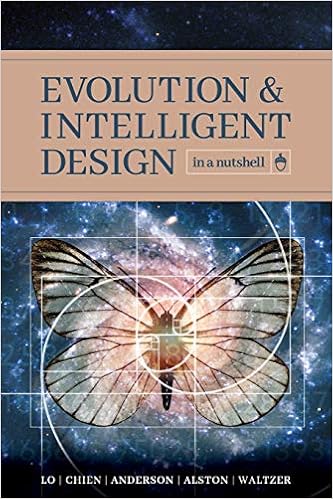Originally, it was a “preselection mechanism,” “self-generated order” and “selective processes” on, originally, non-living chemicals:
Evolved ribozymes (RNA-based enzymes) have a very specific base sequence that enable the molecules to fold into particular shapes, while the vast majority of oligomers formed on the Early Earth most probably had random sequences. “The total number of possible base sequences, known as the ‘sequence space’, is incredibly large,” says Patrick Kudella, first author of the new report. “This makes it practically impossible to assemble the complex structures characteristic of functional ribozymes or comparable molecules by a purely random process.” This led the LMU team to suspect that the extension of molecules to form larger ‘oligomers’ was subject to some sort of preselection mechanism.
The researchers were also able to identify the causes of this ‘self-generated’ order. They found that the majority of sequences obtained fell into two classes — with base compositions of either 70 % adenine and 30 % thymine, or vice versa. “With a significantly larger proportion of one of the two bases, the strand cannot fold onto itself and remains as a reaction partner for the ligation,” Braun explains. Thus, hardly any strands with half of each of the two bases are formed in the reaction. “We also see how small distortions in the composition of the short DNA pool leave distinct position-dependent motif patterns, especially in long product strands,” Braun says. The result surprised the researchers, because a strand of just two different bases with a specific base ratio has limited ways to differentiate from each other. “Only special algorithms can detect such amazing details,” says Annalena Salditt, co-author of the study.
The experiments show that the simplest and most fundamental characteristics of oligomers and their environment can provide the basis for selective processes. Even in a simplified model system, various selection mechanisms can come into play, which have an impact on strand growth at different length scales, and are the results of different combinations of factors. According to Braun, these selection mechanisms were a prerequisite for the formation of catalytically active complexes such as ribozymes, and therefore played an important role in the emergence of life from chaos.
Ludwig-Maximilians-Universität München, “Origin of life: Did Darwinian evolution begin before life itself?” at ScienceDaily
The paper is open access.
They don’t call it Darwinism (natural selection acting on random mutation), of course, but that is clearly what their paraphrases are talking about. Those of us who are already skeptical of the immense role Darwinism is supposed to play after life already exists will find this prebiotic Darwinism hard to swallow. But reader Eric Anderson writes to assure us that that is in fact what origin of life researchers do believe:
The specific paper is a lot of speculation and guesswork, but it is interesting to see them (timidly, with a question mark) put in their title what is already admitted in the research community (although much less understood by outside observers). Let me put it in context.
There is no question that the primary abiogenesis researchers today believe Darwinian evolution took hold before the first living organism arose. Szostak, Joyce and others have explicitly stated as much. The entire RNA-World hypothesis (by far the most popular abiogenesis proposal over the past several decades) rests on the idea of a simple self-replicator, usually conceived of as a single RNA molecule (a relatively-short polymer), which is thought to have the amazing capacity to self-replicate. Why is this important? Because, they imagine that once a self-replicator exists, then Darwinian evolution can step in to do the rest. This fictional self-replicating molecule can be traced back through Dawkins’ explicit claim in The Selfish Gene, back through Haldane and Oparin, and back to Darwin’s warm little pond speculation in his 1872 letter to Joseph Hooker. Newer ideas gaining traction in the last few years, such as a hybrid RNA-DNA World, also depend on Darwinian evolution to step in once some hypothetical self-replicator is on the scene. Membrane first and metabolism first approaches also rely on Darwinian evolution to build a functional cell.

The bright line that is ofttimes spoken of between origin of life and evolution is simply not true in current abiogenesis research. Many defenders of evolution have long tried to draw this bright line between the two in order to insulate evolution from the difficulties of OOL. For their part, many abiogenesis critics and ID proponents have bought into this outdated paradigm and have also misunderstood how critical Darwinian evolution is to current OOL theories.
Most researchers in the field have given up hope of OOL without Darwinian evolution and are specifically counting on it to bring its magic to bear. Thus, Darwinian evolution is absolutely essential to current approaches in abiogenesis research. The idea is to get some simple self-replicator, and then, it is hoped, the hard part will be done. We’ll then turn it over to Darwin to build the first living cell. Ta Da!
I specifically discuss this current paradigm in Chapter 3 of Evolution and Intelligent Design in a Nutshell.
P.S. It is also important to note that self-replication is the critical conceptual node of the abiogenesis idea. Lots of very important challenges that ID proponents raise, like getting a functional membrane, getting new genes, getting information-rich information processing systems, building cellular components, building irreducibly complex molecular machines… all the hard stuff… rolls off abiogenesis researchers like water off a duck’s back. Why? Because they imagine Darwinian evolution can do it all. We just need a simple self-replicator. This is why I have been trying to focus attention on the simple self-replicator as the critical lynchpin of the abiogenesis claim, as well as its Achilles heel.
Question: If it’s that simple, why isn’t life coming into existence from non-life all the time? As opposed to, say, never?
Note: Anderson reads an excerpt from Evolution and Intelligent Design in a Nutshell. He also did a podcast at Breakpoint with Shane Morris.